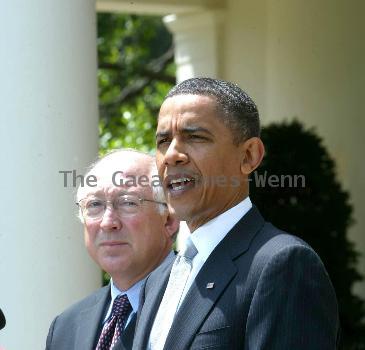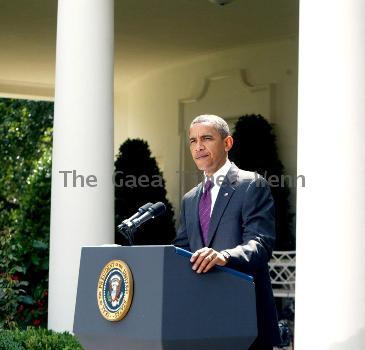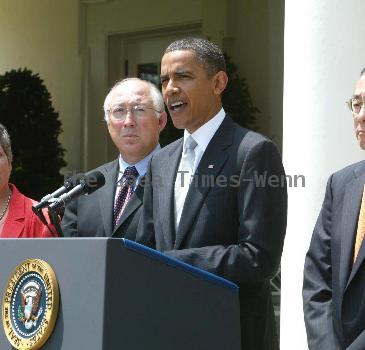Tea party favorite O’Donnell wins GOP Senate primary in Delaware over longtime congressman
By Michael R. Blood, APWednesday, September 15, 2010
Big night for tea party: O’Donnell wins Delaware
It’s tea time in America.
Conservative Christine O’Donnell pulled off a stunning upset over nine-term Rep. Mike Castle in the Republican Senate primary in Delaware Tuesday, propelled by tea party activists into a November showdown with Democrat Chris Coons. After a primary season shaped by economic pain and exasperated voters, the grass-roots, antiestablishment movement can claim wins in at least seven GOP Senate races, a handful of Republican gubernatorial contests and dozens of House primary campaigns, and it influenced many others.
In the fight for New Hampshire’s Republican Senate nomination, a second insurgent trailed in vote counting that was still going on Wednesday. After lagging in early returns, former Attorney General Kelly Ayotte moved ahead of Ovide Lamontagne with a lead of roughly 1,000 votes, with results tallied from 85 percent of precincts. Ayotte was backed by establishment Republicans and Alaska Gov. Sarah Palin; Lamontagne, a former chairman of the state Board of Education, campaigned with the support of tea party activists.
In New York, tea party ally Carl Paladino dealt another shock to the GOP establishment, defeating former Rep. Rick Lazio in the race for the party’s nomination for governor. Paladino will face state Attorney General Andrew Cuomo, the well-known son of former Gov. Mario Cuomo.
The Delaware outcome reflected the energy and enthusiasm of the tea partiers, but O’Donnell also enters the race against Coons as an underdog, putting GOP control of the Senate further out of reach. Former George W. Bush political adviser Karl Rove told Fox News Channel, “This is not a race we’re going to be able to win.” Delaware Republicans had actively worked against O’Donnell in Tuesday’s primary.
On Wednesday, a triumphant O’Donnell accused the party of “Republican cannibalism.”
“We have to rise above this nastiness and unify for the greater good, because there’s a lot of work to be done and there are a lot of people who want to get involved if the Republican Party would,” O’Donnell said in an interview with The Associated Press.
O’Donnell said she hopes the party will unite to help her win in November, but said, “It is doable without the support of the Republican Party.”
Democratic National Committee chief Tim Kaine told NBC’s “Today” on Wednesday that O’Donnell’s win was good for Democrats and a further sign of the “civil war” in the Republican party.
“That creates opportunities for us,” he said. The O’Donnell win shows that moderate Republican voters are being forced from their party and will “have to look long and hard before supporting these candidates,” Kaine said.
Speaking Tuesday night at an Elks Lodge in Dover, Del., O’Donnell thanked Sarah Palin for her endorsement as well as the Tea Party Express, a California political committee that spent at least $237,000 to help her defeat Castle, a moderate and a fixture in Delaware politics for a generation.
Republican Party officials who saw Castle as their only hope for winning the Delaware seat once held by Vice President Joe Biden made clear they will not provide funding for O’Donnell in the general election. The Republican state chairman, Tom Ross, has said O’Donnell “could not be elected dogcatcher,” and records surfaced during the campaign showing that the IRS had once slapped a lien against her and that her house had been headed for foreclosure. She also claimed — falsely — to have carried two of the state’s counties in a race against Biden six years ago.
In Minneapolis, former President Bill Clinton said the Republican Party is pushing out pragmatic voices in favor of candidates that make former President George W. Bush “look like a liberal.”
O’Donnell has said she would work in Congress to repeal President Barack Obama’s health care overhaul. She was also a spokeswoman for Concerned Women for America, a conservative Christian group that opposes abortion, including in the case of rape, and supports abstinence-only sex education.
The victories by O’Donnell and Paladino are the latest evidence of the influence of the tea party movement, a loose-knit coalition of community groups that advocate limited government, tightfisted spending and free markets.
Massachusetts Sen. Scott Brown, who was aided by spending by the Tea Party Express, became an overnight Republican star in January when he claimed the seat held for decades by the late Sen. Edward M. Kennedy. Brown’s win set the stage for a year of outsider candidates, and the tea party has scored prominent primary election wins in Utah, Nevada, Kentucky, Colorado and Alaska.
But can they win in November?
O’Donnell and other tea party candidates have called for an abrupt turn toward austere government, and the question will be how far voters want to go to reshape Washington.
The movement’s spirited rallies have attracted tens of thousands of people, and they’ve made their presence felt at the polls: Republican turnout in the primary season has well outpaced Democratic. Even in races where the tea party has been less visible, its influence is evident in candidates’ arguments. In the California race for governor, Democrat Jerry Brown is depicting himself as a tax-cutter who keeps his eye on the bottom line.
But for all its enthusiasm, the tea party has elevated sometimes unpolished or flawed candidates who — in some cases — will be more vulnerable in November, particularly in states or districts that are more moderate. The movement has also opened fissures with the GOP establishment. In Alaska, Sen. Lisa Murkowski, who was defeated by tea party favorite Joe Miller, is considering a write-in candidacy and says the Alaska Republican party was “hijacked” by the Tea Party Express, which she calls an “extremist group.” The committee, based in California, endorsed Miller and ran ads supporting him.
Senate Majority Leader Harry Reid of Nevada once appeared headed for near-certain defeat in the state that has the nation’s highest unemployment, but he’s now running even with tea party favorite Sharron Angle, a Republican who wants to phase out Social Security for younger workers, opposes abortion in all cases, including rape and incest, and would break up the federal Education Department.
In Colorado, Republicans tried to get their nominee for governor, tea party favorite Dan Maes, to quit the race after embarrassing missteps. He’s claimed he worked as an undercover police officer in Kansas — statements that have not been corroborated by authorities — and he once suggested that a Denver bike-sharing program is part of a U.N. conspiracy to control American cities.
For the GOP, the tea party “is a mixed blessing,” said Bill Whalen, a fellow at the conservative Hoover Institution.
The movement’s voters are energized but “anyone but Sharron Angle would have Harry Reid dead to rights. Abolishing the Education Department, it’s a little too much,” Whalen said.
The loosely connected movement, which took shape in early 2009 in reaction to bailouts and rising government debt, has no central organization that endorses candidates. There are thousands of local chapters, some of which are tethered to national groups.
Tea party candidates have been aided by support from conservative political committees that share the movement’s limited government, free market agenda, including the Tea Party Express, FreedomWorks, Club for Growth and South Carolina Sen. Jim DeMint’s Senate Conservatives Fund.
The financial arm of the Tea Party Express — the Our Country Deserves Better PAC — has spent about $1.6 million in advertising and mailings in a handful of races, including $237,000 in Delaware. It pumped $588,000 into the GOP primary in Alaska to lift Miller over Murkowski.
The Tea Party Express’ biggest investment has been in Nevada, where it has spent $790,000 on Angle’s behalf. It also spent about $350,000 in Massachusetts to help Brown win.
Associated Press writers Jim Kuhnhenn in Washington and Becky Bohrer in Juneau, Alaska, contributed to this report.
Tags: 2010 United States General Election, Alaska, Barack Obama, Bill Clinton, California, Campaigns, Delaware, District Of Columbia, Education Policy, Events, General Elections, Nevada, North America, Political Endorsements, Primary Elections, Sarah Palin, United States, United States General Election













